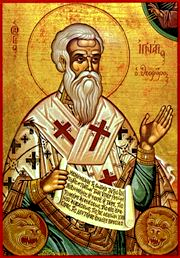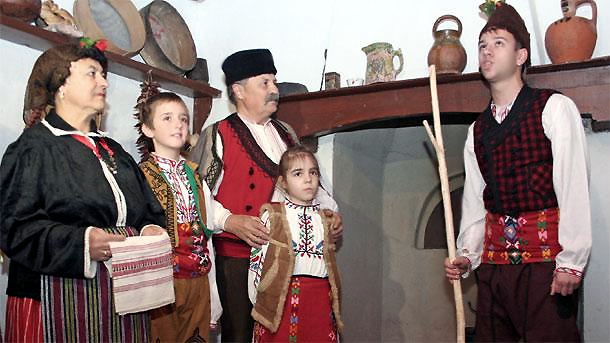Ignazhden, St. Ignatius day is a Christian Orthodox as well as a traditional feast day which falls on 20 December. In the liturgical calendar, this is a date commemorating Holy Hieromartyr Ignatius the Godbearer. He is said to be the child God picked up in His arms, showed to the apostles and said: “Unless you be converted, and become as little children, you shall not enter into the kingdom of heaven.” Ignatius was ordained Bishop of Antioch by Apostle Paul. He ended his life as a martyr in Rome, where he was thrown to the lions.
 According to Christian tradition, Ignazhden is the day that the Virgin Mary started suffering birth pains – a frequent motif in folk songs sung at this time of year: “The Mother of God was in travail, from Ignazhden to Christmas”. To our forefathers, the day of St. Ignatius marked the beginning of the new year. That is why, in some parts of the country it is also known as Young Year, Young Day, New Day. Renowned Bulgarian ethnographer Dimitar Marinov provides intriguing details explaining the etymology of the word Ignazhden. In the notes he made at the turn of the 20th century as he travelled in Eastern Bulgaria, he quotes elderly women who talk about the day of St. Ignatius. “These grannies tell me that at first it was called Idinak, Idinazhden, and only later did it come to be named Ignat,” Marinov writes and explains that idinak (lone) is a name given to the beginning of the year, but also to yearling foal, calves etc.
According to Christian tradition, Ignazhden is the day that the Virgin Mary started suffering birth pains – a frequent motif in folk songs sung at this time of year: “The Mother of God was in travail, from Ignazhden to Christmas”. To our forefathers, the day of St. Ignatius marked the beginning of the new year. That is why, in some parts of the country it is also known as Young Year, Young Day, New Day. Renowned Bulgarian ethnographer Dimitar Marinov provides intriguing details explaining the etymology of the word Ignazhden. In the notes he made at the turn of the 20th century as he travelled in Eastern Bulgaria, he quotes elderly women who talk about the day of St. Ignatius. “These grannies tell me that at first it was called Idinak, Idinazhden, and only later did it come to be named Ignat,” Marinov writes and explains that idinak (lone) is a name given to the beginning of the year, but also to yearling foal, calves etc.
 Ignazhden ushers in a new beginning and to welcome it, there are a great many rituals performed to bring fertility to men and cattle, a bountiful harvest in the fields and in the garden. Quite a few of the rituals are performed to ward off disease, pests in the home and in the field, as well as supernatural demonic creatures. In the eastern part of the country, the first thurified dinner is eaten on the night before St. Ignatius’ day. The meal is meatless and includes ritual loaves of bread, raw wheat, whole walnuts, onions, pickles. The most important ritual of all is called Polyazvane (derived from lazya, crawl), hence this day is also known as Polyaz, Polazovden. It is believed that depending on who the first person to enter the home on this day shall be, we can tell what kind of year lies ahead for the household. They all hope that the polyaznik will be healthy, hardworking, respectable, wealthy and diligent. This is the kind of spolez everyone hoped for, and if the year did prove to be a successful one, then the family would do everything they could to have the same person enter their home first the following year. They welcomed him with open arms, wined and dined him and showered him with gifts. This is a day when it is said no one must leave the house, or if one has to, then they must not return empty handed. Once, straw would be strewn around the door, and before stepping over the threshold, the members of the household would pick some of it up. On the day of St. Ignatius, nothing must be taken out of the house, nothing must be lent or given away as a gift. Wives and young brides must not do any woman’s work. On this day young lads begin to prepare for the songs they will sing and the incantations they will say on Christmas Eve.
Ignazhden ushers in a new beginning and to welcome it, there are a great many rituals performed to bring fertility to men and cattle, a bountiful harvest in the fields and in the garden. Quite a few of the rituals are performed to ward off disease, pests in the home and in the field, as well as supernatural demonic creatures. In the eastern part of the country, the first thurified dinner is eaten on the night before St. Ignatius’ day. The meal is meatless and includes ritual loaves of bread, raw wheat, whole walnuts, onions, pickles. The most important ritual of all is called Polyazvane (derived from lazya, crawl), hence this day is also known as Polyaz, Polazovden. It is believed that depending on who the first person to enter the home on this day shall be, we can tell what kind of year lies ahead for the household. They all hope that the polyaznik will be healthy, hardworking, respectable, wealthy and diligent. This is the kind of spolez everyone hoped for, and if the year did prove to be a successful one, then the family would do everything they could to have the same person enter their home first the following year. They welcomed him with open arms, wined and dined him and showered him with gifts. This is a day when it is said no one must leave the house, or if one has to, then they must not return empty handed. Once, straw would be strewn around the door, and before stepping over the threshold, the members of the household would pick some of it up. On the day of St. Ignatius, nothing must be taken out of the house, nothing must be lent or given away as a gift. Wives and young brides must not do any woman’s work. On this day young lads begin to prepare for the songs they will sing and the incantations they will say on Christmas Eve.
English version: Milena Daynova
Photos: archiveOn 22 November, the Association of Bulgarian Folk Ensembles Abroad (ABFEA) will present its project, 'Online Catalogue of Bulgarian Horo and Other Dances', in three European cities: Lyon, Munich and Copenhagen. 'Our goal is to preserve Bulgarian..
‘The Bulgarian horo is a kind of magic — an enchanted circle that pulses with the unique energy of our spirit, our traditions and our identity,’ says journalist Milena Milotinova, who recently presented her new documentary The Magic of the Bulgarian..
The Eastern Rhodopes come to life in the heart of Sofia – with authentic flavoуrs, music and craftsmanship . Residents of the Bulgaria capital have a chance to immerse themselves in the atmosphere of Momchilgrad Municipality and its cultural and natural..

+359 2 9336 661
